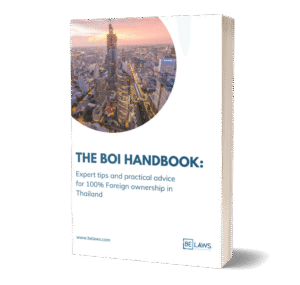Legal
How to Start a Business with 100% Ownership in Thailand
TL;DR: How to start a business in Thailand as a foreigner largely depends on your chosen structure and activities. While the Foreign Business Act (FBA) restricts foreign participation in over 50 industries, there are several legitimate ways to achieve 100% ownership. Foreign investors can register export or manufacturing businesses without restrictions, or apply for a BOI promotion from the Board of Investment Thailand. BOI benefits for foreign investors include access tax incentives, land ownership rights, and visa flexibility.
If you’re planning to start a business in Thailand, one of the first questions you’ll likely ask is whether full foreign ownership is possible. For most business activities commonly chosen by foreign investors, Thai law requires that Thai nationals hold at least 51% of the company’s shares.
However, there are several legal pathways that allow foreign entrepreneurs to maintain 100% ownership, depending on the nature of the business and the structure chosen. In this blog, we will explore these options and the requirements for obtaining them.
Key Points
- The Foreign Business Act Thailand prohibits or restricts foreigners from engaging in over 50 categories of business activities, categorised into three lists.
- A Foreign Business License (FBL) allows foreigners to operate restricted activities if their business provides significant benefit to Thailand, though approval is difficult.
- Export and manufacturing businesses can be fully foreign-owned without FBLs or Thai partners.
- A BOI Promotion in Thailand provides 100% foreign ownership. Other BOI benefits for foreign investors include tax exemptions, land ownership rights, and visa/work permit flexibility.
- The Treaty of Amity Thailand grants US-majority-owned companies the right to operate with full foreign ownership, subject to sectoral restrictions.
How does The Foreign Business Act (FBA) Affect Foreign Investors?
Although Thailand continues to encourage foreign investment, certain business activities remain restricted exclusively for Thai nationals. These restrictions are established by the Foreign Business Act (FBA), which was introduced to regulate the activities of foreign individuals and entities in Thailand.
Under the FBA, there are more than 50 categories of restricted business activities in Thailand. For companies engaged in these activities, foreign ownership is limited to a maximum of 49.99%, unless the company obtains a Foreign Business License (FBL) or has obtained a promotion from the Board of Investment Thailand (BOI).
If foreign nationals hold 50% or more of the company’s shares, the company will be considered as a foreign company.
It is also important to point out that the use of nominee shareholders is strictly prohibited in Thailand. A nominee shareholder refers to a Thai individual who holds shares on behalf of a foreigner without having any genuine rights, responsibilities, or control over the company.
Who does the Foreign Business Act Consider a Foreigner?
Section 4 of the Foreign Business Act provides the definition for what is considered a foreigner:
- A natural person who is not a Thai national.
- A juristic person not registered in Thailand.
- A juristic person registered in Thailand where:
- At least half of the capital shares are held by persons described in (1) or (2), or
- Foreign persons under (1) or (2) hold an investment equivalent to at least half of the company’s total capital.
- A limited partnership or registered ordinary partnership in which the managing partner or manager is a person under (1).
- A juristic person registered in Thailand where at least half of the capital shares are held by persons described in (1), (2), or (3), or where foreign investment in the company is equivalent to at least half of the total capital.
What are Considered Restricted Activities Under the Foreign Business Act?
Under the Foreign Business Act Thailand (FBA), foreign business restrictions apply to approximately 50 business sectors. These restricted activities are organised into three separate lists.
List one includes newspaper businesses, animal farming, land trading and other activities. Foreigners are prohibited from operating businesses in list one for “special reasons” and there is no approval available for a foreigner or foreign entity to obtain.
List two has three groups and includes businesses related to national security and domestic land, waterway, or air transportation (including the domestic airline business). Foreigners or foreign entities can operate a business engaged in list two activities if approval has been given by the Minister of Commerce and the Cabinet. However, it is very difficult to obtain such approval.
List three Foreigners and foreign entities are prohibited from engaging in list three activities on the grounds that “Thai nationals are not ready to compete” with foreigners. It is possible for foreigners and foreign entities to receive approval from the Director-General of the Commercial Registration of the Department of Business Development and the Foreign Business Committee for these activities. List three consists of “other categories of service business except those prescribed by ministerial regulations”.
Foreign Business Licenses (FBL)
Foreign businesses that wish to engage in activities listed under List 2 or List 3 of the Foreign Business Act (FBA) as a fully or majority foreign owned business must first obtain a Foreign Business License (FBL).
By obtaining a FBL, foreign or majority foreign owned companies will be granted permission to engage in restricted activities without the need to have a Thai partner.
The application for an FBL is submitted to the Department of Business Development (DBD) and then reviewed by either the Cabinet or the Foreign Business Committee, depending on the business activity involved.
When assessing applications, authorities consider a range of factors, such as:
- The impact on national security, safety, and stability
- Contribution to economic and social development
- The scale of the enterprise
- Opportunities for local employment and skill transfer
When applying for a Foreign Business License in Thailand, approval is more likely when the business can clearly demonstrate that it will deliver meaningful benefits to the country. This includes contributing to Thailand’s economic growth, creating jobs for local employees, or introducing advanced technology and expertise that may not otherwise be available domestically.
Authorities also prioritise projects that help protect and promote national interests through either knowledge transfer, sustainable practices, or supporting the government’s broader development goals.
However, the applicants should not be in direct competition with Thai-owned businesses and should complement or strengthen existing industries.
Activities Allowing 100% Foreign Ownership in Thailand Without Special Permissions
Thai law allows companies to be 100% foreign owned, however, depending on the business activities undertaken by the company, there may be limits and foreign business restrictions applied, for example, on foreign ownership.
Unrestricted business activities in Thailand that allow 100% ownership as foreigner without having to obtain a FBL or other form of permission include:
Export Companies
One of the most straightforward paths to 100% ownership is by starting an export company in Thailand. Thai law encourages exports, and companies exclusively exporting products outside Thailand are eligible for full foreign ownership.
However, only an export business in Thailand, whose income and operations are strictly international, may be fully foreign-owned. It is important to note that these companies are prohibited from selling directly within the Thai domestic market.
Read more:
Manufacturing Companies
Operating a manufacturing business in Thailand can generally be 100% foreign-owned in Thailand. Unlike many other business activities, manufacturing is not on Thailand’s “restricted” list for foreign ownership under the Foreign Business Act (FBA). This allows foreign investors to own and operate manufacturing businesses without needing a Thai partner.
Another advantage for manufacturing companies is their eligibility for a BOI promotion. BOI promotions offer many advantages including different types of tax exemptions including Corporate Income Tax exemptions and tax exemptions on import of machinery. BOI promotions can also allow full foreign ownership and the ability to own land which can be used for their factory etc.
Representative Offices
A Representative Office in Thailand can serve as an alternative for companies wanting a local presence without commercial activities. Representative Offices in Thailand are limited to specific activities, such as market research, product sourcing, and customer support on behalf of a parent company abroad.
While Representative Offices can be wholly foreign-owned, they cannot generate revenue in Thailand. This setup is ideal for companies needing a base in Thailand to support regional activities, maintain brand visibility, or gain market insights without engaging in direct sales.
Learn more about Representative Offices here.
How can a Board of Investment (BOI) Promotion Help Foreign Companies?
For foreign entrepreneurs, applying for a Board of Investment (BOI) promotion in Thailand can be a major advantage. A BOI promotion in Thailand gives businesses access to valuable incentives and benefits that make it easier to operate and grow in the Thai market.
A common misconception is that the BOI will only support projects which are technologically advanced or with a heavy emphasis on technology, however, this is not the case and the BOI offers promotions for many different business activities.
The BOI offers promotions across a wide variety of different business activities including digital and software activities, manufacturing, real estate, and business process outsourcing (BPO), including back-office support services. The BOI also offers a promotion which covers various service-oriented businesses, called the TISO (Thailand Investment Support Office).
Another important fact is that most BOI-promoted projects in Thailand have relatively low minimum capital requirements, which vary depending on the type of business activity and the promotion category. In many cases, projects can qualify with an investment of as little as 1 million THB, making BOI promotion accessible even to smaller ventures.
This is significantly less than the capital typically required by non-BOI companies to support foreign work permits, normally 2 million THB per work permit. As a result, BOI promotion provides a more affordable and flexible route for foreign investors looking to establish and operate a fully foreign-owned business in Thailand.
This wide scope of eligible activities means that a BOI promotion in Thailand is likely to have a promotional package that could cover your business activities. We always recommend the first step for a foreign investor in Thailand is check whether your company is eligible for a BOI promotion.
BOI promoted companies have access to great benefits that are not available to other business structures in Thailand such as:
- 100% foreign ownership in Thailand,
- Possibility for land ownership
- tax exemptions and
- relaxed rules for work permits and visas.
For more information about the BOI, including eligibility, benefits, and the obligations of running a BOI-promoted company, download our free BOI eBook.
Industrial Estate Authority of Thailand (IEAT)
The Industrial Estate Authority of Thailand (IEAT) is operated by the Ministry of Industry and has been designed to develop and manage industrial estates and ports in Thailand and provides eligible businesses with a wide range of benefits. These include the ability to hold 100% foreign ownership, as well as access to a one-stop service centre (OSS) that supports companies through every stage of the process.
In addition to administrative support, the IEAT Thailand also offers a combination of tax incentives (such as exemptions on import duties for raw materials and machinery) and non-tax benefits (including permission to own land within industrial estates and simplified visa and work permit processes for foreign staff).
However, companies operating within the IEAT Thailand are also subject to certain requirements, including:
- Locating Operations in IEAT Zones: Businesses must set up within an approved industrial estate or free zone to qualify.
- Environmental and Safety Standards: Companies must comply with strict environmental, safety, and waste management regulations.
- Reporting Requirements: Regular compliance reports, including details of operations, employment, and environmental impact, must be submitted to the IEAT.
- Activity Limitations: Businesses must operate within the approved activity scope defined in their IEAT license.
The IEAT also promotes the hiring of foreign skilled workers within the industrial zones who possess talent with specialised knowledge and expertise. This allows businesses to hire professionals who can contribute to the growth and development of their operations.
The IEAT will approve the hiring of the following positions:
- directors,
- presidents,
- finance and administration personnel,
- executive assistants,
- factory assistants,
- marketing,
- export, and
- sales professionals.
Eastern Economic Corridor (EEC)
The Eastern Economic Corridor (EEC) is a special economic zone that operates in the following Thai provinces, Chachoengsao, Chonburi, and Rayong. The EEC in Thailand was designed to help push the “Thailand 4.0″ economic model”, which looks to move the Thai economy into a high-tech, value-based economy.
What Business Activities are Eligible for a Promotion from the EEC in Thailand?
While the BOI offers a broad range of promotions spanning across many different industries, the EEC is much more limited in scope. Eligibility for the EEC is only available to Thailand 4.0 policy’s vision of fostering advanced industries. The EEC is available for companies within the following sectors:
The new next-generation sectors:
- next-generation automotive,
- intelligent electronics,
- advanced agriculture and biotechnology,
- food for the future,
- high-value and medical tourism, and digital technologies,
- Automation and robotics,
- Aviation and logistics
- Biofuel and biochemical
- Defence
- Education & HR
What Benefits are Offered by the EEC?
Eligible projects within the EEC are eligible for the following attractive incentives:
- 100% foreign ownership of a company
- corporate tax exemptions of up to 15 years,
- exemption from import duties,
- matching grants.
Foreign employees who work for companies that have been granted a promotion from the EEC are also eligible for the EEC visa which has the following benefits:
- All EEC visa holders will be granted a work permit
- A flat Personal Income Tax Rate of 17% (instead of the progressive rate up to 35%).
- 10 Year validity
- Multiple entry visa
- Use of the Fast-Track Channel at selected airports.
Treaty of Amity: For US Investors
The Treaty of Amity, originally signed in 1833 and amended in 1966, allows U.S. citizens and businesses incorporated in the U.S., or those majority-owned by U.S. citizens, to enjoy certain privileges when operating in Thailand.
The Treaty of Amity grants national treatment, enabling American companies to engage in business activities on similar terms as Thai companies and exempting them from most restrictions on foreign investment imposed by the Foreign Business Act of 1999.
What is considered a US Company?
The Ministry Of Commerce in Thailand has established the qualifications for a U.S. company to be eligible for the protections offered by the Treaty of Amity are as follows:
- The applicant must be Juristic person incorporated under the laws of Thailand or the United States of America;
- At least 51% of the shares must be held by American nationality;
- More than half of the directors must be American and/or Thai persons;
- If one director is authorized to sign on behalf of the company, such director must not be of a third-country nationality;
- If more than one director is jointly authorized to sign on behalf of the company, the majority of such directors must not be of a third-country nationality; and
- If there is any non-US authorized director, he or she must always co-sign with a US authorized director to bind the company).
What are the benefits of the Treaty of Amity for American companies in Thailand?
Under the Treaty of Amity, U.S. companies enjoy two major benefits:
Ownership Rights
American companies can maintain a majority shareholding or wholly own their company, branch office, or representative office in Thailand. This allows for greater control and flexibility in managing business operations.
National Treatment
American companies receive national treatment, which means they can engage in business activities on the same basis as Thai companies. This exemption from restrictions on foreign investment provides a competitive edge and opens doors to a wide range of opportunities in various industries.
Are there any limitations and/or restrictions for Treaty of Amity companies?
While the Treaty of Amity offers numerous advantages, there are certain limitations and restrictions that American investors should be aware of. For example, Treaty of Amity promoted companies are restricted for engaging in the business activities relating to:
- Communications;
- Transportation;
- Banking involving depository functions;
- Land ownership, exploitation of land or other natural resources; and
- Domestic trade in indigenous agricultural products.
How can Belaws help?
For more information about 100% foreign ownership of a business in Thailand, why not talk to one of our experts now?
Please note that this article is for information purposes only and does not constitute legal advice.
Receive our
BOI Handbook
FAQ
Can foreigners own 100% of a business in Thailand?
Yes, foreigners can own 100% of a business in Thailand, depending on the type of business and its structure. Activities such as export and manufacturing can be fully foreign-owned without restrictions, while other sectors may require a Foreign Business License (FBL) or Board of Investment (BOI) promotion.
What is the Foreign Business Act (FBA) in Thailand?
The Foreign Business Act (FBA) is a law that regulates foreign participation in business activities in Thailand. It limits foreign ownership to 49.99% in more than 50 business categories unless an exemption applies, such as through a BOI promotion or an FBL.
Who is considered a foreigner under Thailand’s Foreign Business Act?
Under Section 4 of the FBA, a foreigner includes any natural person who is not a Thai national, companies registered abroad, and Thai-registered companies where at least half of the shares or control belong to foreign nationals.
What are restricted business activities under the Foreign Business Act?
Restricted business activities are grouped into three lists under the FBA. List 1 prohibits certain activities entirely, such as farming and land trading. Lists 2 and 3 restrict foreign participation but allow exceptions through special approvals or licenses.
What is a Foreign Business License (FBL) in Thailand?
A Foreign Business License (FBL) allows a foreign-owned company to operate in restricted business sectors. It must be obtained from the Department of Business Development (DBD), and approval depends on factors such as the company’s economic benefit to Thailand and local job creation.
How difficult is it to get a Foreign Business License in Thailand?
Obtaining a Foreign Business License in Thailand can be challenging. Approval is granted only when a business can demonstrate significant benefits to Thailand, such as technology transfer, employment creation, or contribution to economic development.
What types of businesses can be 100% foreign-owned in Thailand without special permission?
Export and manufacturing businesses in Thailand can be 100% foreign-owned without needing a Foreign Business License. Representative Offices can also be fully foreign-owned but are prohibited from engaging in commercial transactions.
Can a foreigner own an export company in Thailand?
Yes. Export businesses that sell exclusively to international markets are allowed 100% foreign ownership. However, they cannot sell directly within Thailand’s domestic market.
Can a foreigner own a manufacturing company in Thailand?
Yes. Manufacturing is not restricted under the Foreign Business Act, allowing foreigners to own 100% of a manufacturing business in Thailand. These companies can also qualify for BOI promotions that provide tax incentives and land ownership rights.
What is a Representative Office in Thailand?
A Representative Office in Thailand is a non-trading entity that can be fully foreign-owned. It is limited to activities such as market research, sourcing, and customer support and cannot generate revenue within Thailand.
What is a BOI promotion in Thailand?
A BOI promotion is a government incentive program managed by the Board of Investment of Thailand. It allows 100% foreign ownership and provides benefits such as tax exemptions, land ownership rights, and relaxed visa and work permit rules.
What business activities qualify for a BOI promotion in Thailand?
BOI promotions are available across various sectors, including digital technology, manufacturing, real estate, logistics, and business process outsourcing. The Thailand Investment Support Office (TISO) covers service-based industries.
How much investment is required for a BOI-promoted company in Thailand?
Most BOI-promoted projects have relatively low minimum investment requirements, starting at around 1 million THB, depending on the business activity. This is lower than the 2 million THB capital typically required for non-BOI companies per foreign work permit.
What benefits does a BOI promotion offer foreign investors in Thailand?
BOI-promoted companies enjoy benefits such as 100% foreign ownership, corporate income tax exemptions, import duty exemptions, land ownership rights, and flexible visa and work permit conditions for foreign employees.
What is the Industrial Estate Authority of Thailand (IEAT)?
The Industrial Estate Authority of Thailand (IEAT) develops and manages industrial estates and ports. Companies operating within IEAT zones can enjoy 100% foreign ownership, land rights, and both tax and non-tax incentives.
What are the requirements for operating under the IEAT in Thailand?
To qualify for IEAT benefits, companies must locate their operations in designated industrial zones, meet environmental and safety standards, submit regular compliance reports, and operate within approved activity scopes.
. What is the Eastern Economic Corridor (EEC) in Thailand?
The Eastern Economic Corridor (EEC) is a special economic zone covering Chachoengsao, Chonburi, and Rayong provinces. It supports the “Thailand 4.0” vision by attracting investment in high-tech and next-generation industries.
What industries qualify for promotion under the EEC?
EEC eligibility focuses on advanced industries such as next-generation automotive, intelligent electronics, biotechnology, food innovation, medical tourism, aviation, logistics, biofuels, defence, and education.
What benefits do companies receive under the EEC in Thailand?
EEC-promoted companies can receive up to 15 years of corporate tax exemption, 100% foreign ownership, import duty exemptions, and access to EEC visas offering a 17% flat personal income tax rate and 10-year validity.
What is the Treaty of Amity between Thailand and the United States?
The Treaty of Amity is an agreement that allows U.S. citizens and companies to own and operate businesses in Thailand with national treatment, exempting them from most restrictions under the Foreign Business Act.
How can a U.S. company qualify for the Treaty of Amity in Thailand?
To qualify, a company must be incorporated in Thailand or the U.S., have at least 51% American ownership, and have a majority of its directors as U.S. or Thai nationals. Authorized signatories must not be from third-country nationalities.
What benefits do American companies receive under the Treaty of Amity?
American companies can hold a majority or full ownership in their Thai entities and enjoy national treatment, allowing them to conduct business on the same terms as Thai companies.
Are there restrictions for U.S. companies under the Treaty of Amity?
Yes. Even under the Treaty of Amity, U.S. companies cannot engage in activities related to communications, transportation, land ownership, natural resource exploitation, or domestic trade in agricultural products.
Is using nominee shareholders legal in Thailand?
No. The use of nominee shareholders—Thai nationals holding shares on behalf of foreigners without actual control or responsibility—is strictly prohibited under Thai law.
What is the best option for foreigners who want 100% ownership in Thailand?
The best option depends on your business type. Export and manufacturing businesses allow 100% ownership directly, while other sectors may achieve full ownership through BOI promotion, IEAT privileges, EEC incentives, or the Treaty of Amity (for U.S. investors).
Related articles
Subscribe today
Subscribe today
To our newsletter for all the latest legal news
in South East Asia, Belaws updates and
special promotions on our services.
To our newsletter today for all the latest legal news in South East Asia,
Belaws updates and special promotions on our services.







